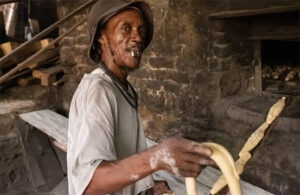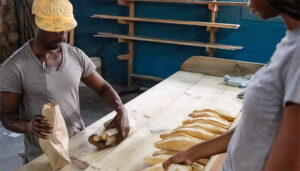Dawn has barely broken, and Alton’s bakery in a side street on the outskirts of Antigua’s capital is already abuzz with activity.

A baker is using a long plank to place loaves into a vast wood-fired oven. Someone else has the task of wiping the ashes off the bread when it comes out, filling the room with its comforting aroma.
Before the morning is out they will have made several hundred of these, to be sold in tiny family-run stores island-wide, or as breakfast for the hungry customers milling in and out, clutching still-warm loaves wrapped in brown paper.
In the vibrant suburb of Gray’s Farm, a world away from the white sand beaches and luxury resorts tourists flock to Antigua to enjoy, Alton’s is a linchpin of community life.
It’s an image mirrored across the Caribbean island where “bread shops” are as much a meeting point, a place to share gossip and a joke, as somewhere to grab an affordable snack.
Rudolph Orr, whose family opened Alton’s a century ago, rises at two in the morning seven days a week to start baking.
Over the last year, however, the soaring cost of flour has taken a massive bite out of the shop’s meagre profit.

But for Mr Orr, passing on the extra costs to his customers is unthinkable.
“If we did, some families around here wouldn’t be able to eat,” he says. “We try to help the people. For a family of seven or eight, an extra dollar on each bread would be a big increase. We are helping them survive.”
Flour imported from neighbouring islands has almost doubled in the last 12 months.
Regular customers come from as far as the other side of the island to pick up their morning loaf before heading into St John’s for work.
Bakery owner Lolita Peters bought the business five years ago when food prices were still relatively stable.
In addition to flour, sugar has also increased by 25%, she says.
“We’ve had ups and downs, but the bakery means a lot to the community and the country at large. They say my bread is the best,” Ms Peters explains.
“I only put my price up a little because I consider there are two of us in the business – the customer and I – and up to now the customer is still on the same wage as before.
“They appreciate that; lots of them come and thank me.”
What the future holds for these traditional shops in the face of unprecedented financial challenges, coupled with an ageing generation of old-style bakers, no-one really knows.
Ms Peters’ granddaughter Ariel Hughes has been helping out at the South Street outlet for most of her life. But, at 18, she has other ambitions.
“I plan on living abroad so I will not be doing this,” she says. “I want to learn cosmetology and do makeup, hair and lashes.”
Ms Peters says she hopes one of her other grandchildren will eventually take over the bakery, but adds: “It seems like they have other interests.”
At Alton’s, Mr Orr says he’s tried in vain to convince his 22-year-old son to learn the trade.


